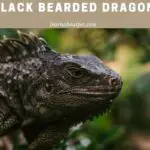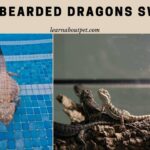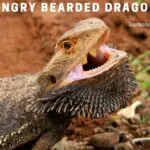Besides their vocal communications, animals also communicate by the body or physical signs to show their response to the environment and their other fellow members and species including humans. One such sign discussed is the bearded dragon puffing up situation.
Is your pet bearded dragon puffed up? The bearded dragons puff up, especially their beard when they feel frightened and endangered. Puffing up enlarges the body to look more hostile to discourage the predator. During the mating period, males also puff up their beards to attract female beardies.
In this blog, we will discuss about the bearded dragon puffed up and answer all queries from pet lovers and look for the reasons for the bearded dragon throat pouch and other queries for the bearded dragon puffing.
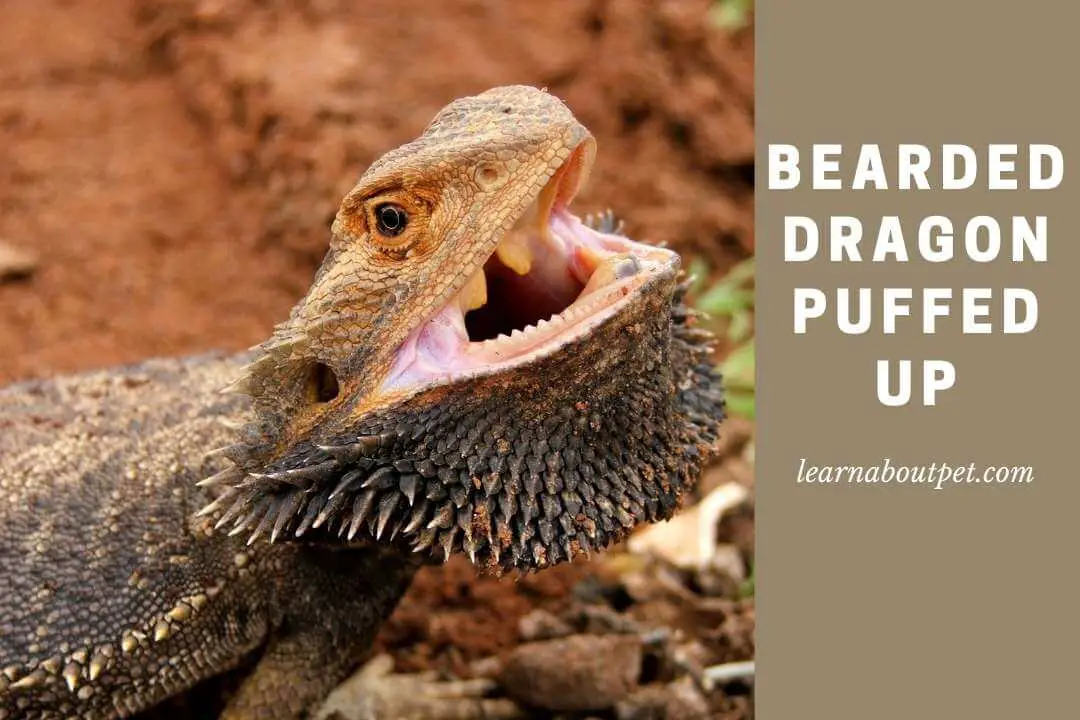
Hope you enjoy this read and we will be glad to answer your queries.
Why Is My Bearded Dragon Puffed Up
Bearded dragon pet owners are quite intrigued to first time see their bearded dragon puffed up and ask why do bearded dragons puff up their throats.
There could be many reasons for your bearded dragon puffed up. Check if it is only its beard or the whole body. Also, observe if the beard is darkened in color.
Listed below are the main reasons for a bearded dragon puffed up. These guidelines also apply to baby bearded dragon puffed up.
Stressed
This is the most common and natural sign of a bearded dragon to display when it is stressed or feels intimidated due to any reason. Also called by some as a bearded dragon throat pouch.
Normally the bearded dragon will swell up its throat area. Sometimes, if it is more frightened it will darken the skin area of the throat, commonly referred to as a black bearded dragon.
A baby bearded dragon puffed up is more likely to be seen, when the baby bearded dragon is newly adapted. New environment, new people naturally upset it.
Give some time to the aggressive baby bearded dragon to adjust to the new environment. It will be ok in a week or so.
Shedding
Adult bearded dragons shed their skin two to three times a year. Baby bearded dragons do more often. This is a natural way for the bearded dragon to help get rid of the shedding dead skin.
Generally, people report about the bearded dragon puffing up shedding. In such cases, people mention bearded dragon puffed up but not black.
Rarely do some pet owners report that their bearded dragon does not puff up during shedding.
To be sure your bearded dragon is shedding, check for light-colored and waxy-looking skin flakes coming off.
Yawning
Sometimes just like humans, with the bearded dragon puffing up, it will also open its mouth to yawn.
Mating
Another reason for the bearded dragon puffed up is during the mating period. The male bearded dragon beard puff up is to attract the females. Bearded dragon beard puffing is also a sign to show dominance.
Some females also puff up to the male bearded dragons, but this is not common. Rather the females respond with a bobbing head or a waving hand.
Territorial behavior
Like most animals bearded dragons are also territorial in nature. They will not like to share their tank with another fellow male or female if they are the same size.
At such times bearded dragon puffing beard is to show their dominance to the other fellow. A larger bearded dragon may share the space with a smaller beardie, but then the smaller beardie will be stressed all time.
Deep Bathwater
By instinct, if the bathwater is above their shoulders, you will find the bearded dragon puffed up belly, to help it float and prevent drowning.
Feed time
It is observed by many pet owners that during feeding the live crickets, the bearded dragon neck puffing plus the bearded dragon puffing up body is observed.
This is mainly to display its aggressiveness to the prey and scare it.
Another observation by some pet owners is that during or after feeding the bearded dragon puffed up belly is observed. This is assumed to make more space for additional food. This is not confirmed by extensive writing.
Excited
It has been observed in some cases a bearded dragon puffed up for no reason, when relaxed and playing or having a meal.
There could be some very subtle indications from around or just the excitement and happiness for the bearded dragon puff.
What Do You Do When Your Bearded Dragon Puffs Up?
A bearded dragon puffed up is not a bad sign. Most of the time the caregivers will make out the reasons for their puffed up bearded dragon and help relieve their loved one.
Most reasons for a bearded dragon puffed up are easily understood and followed. However the reasons for the stress are somewhat difficult to diagnose, as many things are involved.
It needs a methodical approach to eliminate the stress factors one by one. This can be done with patience and is not very difficult as there are not many reasons.
One should not be worried about the bearded dragon puffed up like a balloon state.
Just assure there is no medical or health reason like bearded dragon hard belly. Consult a lizard specialist vet if the beardie looks sick.
Why Does My Bearded Dragon Puff His Beard Out In The Morning?
Some pet owners report their bearded dragon puffed up but not black in the morning. This is a normal morning yawn or stretching for most bearded dragons.
Check if they are shedding. During the shedding period, all bearded dragons do this.
If bearded dragon puffing out beard is the first activity in the morning, then it is just a good habit of your beardie. Nothing to worry about.
How Do You Know When A Bearded Dragon Is Mad?
Besides the general sign of the bearded dragon puffed up, there are many other indications when a bearded dragon is mad. This is more than a bearded dragon puffed up like a balloon situation, especially its bearded area.
They are trying to tell you by displaying certain behaviors they are more stressed.
We describe some such extreme conditions here, which are generally regarded as being mad.
Beard Fluffing
This is the most common display of anger. Whenever the bearded dragon sees any object, which it dislikes and is causing it to stress, the bearded dragon puffing beard not black is a usual sighting.
Beard Dark Color Change
In a more advanced stage of stress and displeasure, the bearded dragon, both male and female will darken their beard area, in some cases, it will be almost black.
Head Bobbing
Head bobbing is bearded dragons’ natural action to intimidate their predator or another beardie. It could also mean that the bearded dragon is accepting submission to the other’s dominance.
Besides the bearded dragon puffed up, if it is head bobbing to the owner, it is stressed.
This is further confirmed by pet owners when they report their bearded dragon puffing beard at me and when they approach nearer, then it displays other signs like hissing and biting.
Biting
The bearded dragon will bite or try to bite the approaching object, be it a hand, another animal, or a stick, as a last resort to defend itself (fight mode).
If one is handling it, at that time hold firmly in the arms with no movements and do not let it go.
By letting it go at that moment the bearded dragon will link it to its aggressive behavior and think this is the right way to behave as he gets what it wants.
Only put down the bearded dragon when it has calmed down, to tell or train him that is the way to get what it wants.
Hissing
Bearded dragon hissing and puffing is another way of expressing fear. The bearded dragons produce this sound from their throats when in danger and they feel threatened.
This is always accompanied by an open mouth and a bearded dragon puffed up beard and a bearded dragon black beard.
People have reported their bearded dragon puffing out air. This is different from the stressed hissing stage. Probably this is air it has gulped in and expelled when picked up.
Gaping
With the bearded dragon puffed up, it will also open its mouth wide. This is just to look larger in size to scare away its predator.
Sometimes bearded dragon puffing beard while basking will also open its mouth wide. This is not a stress sign, rather the beardie is trying to cool off the excess body temperatures.
Raising/twitching tail
The raising of the tail is a sign of alertness. Always done when hunting or going for prey or fight is about to start. It is a sign of aggressiveness. Observed during feeding of live crickets.
A pointed tail with a bearded dragon puffed up and a black beard is a sure sign of a bearded dragon going mad if further approached.
Pet bearded dragons also twitch their tails when they are stressed during handling. You need to develop further bonding with your beardie to avoid this frequent behavior.
Metabolic Bone Disease (MBS) symptoms also look similar to tail twitching, but more like seizures.
Glass surfing
The bearded dragon tries to climb up the glass walls of the tank and looks as if the bearded dragon is trying to escape from the glass tank. This is certainly a sign of stress.
Stand tall
Some pet owners report their bearded dragons standing tall against the tank glass wall and even going to sleep. If there is no other sign of stress then nothing to worry about.
This could be to cool its body by pressing against the cool glass wall. Check the tank temperatures with an accurate temperature probe. The tank should have the required temperature gradients.
Other signs of stress
Besides the above signs for madness in a bearded dragon, there are other signs of stress like
- Hiding
- Less activity
- Heavy breathing
- Refusal to eat
- Diarrhea
- Hard stools/impaction
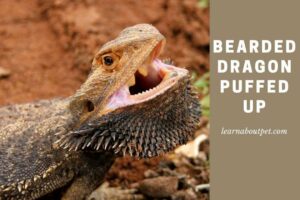
Why Is My Bearded Dragon Puffed Up Like A Balloon?
We quite often hear from bearded dragon pet owners about their bearded dragon puffed up and they query what does it mean when a bearded dragon puffs up.
Bearded dragon puffing up its body is a normal and natural reaction of the bearded dragon to external influences.
Some common reasons for puffing up its body as observed and agreed by all pet owners are cited below.
Shedding
One of the most common reasons for puffing up the whole body is at the time of the skin shedding. Skin shedding is normal in all bearded dragons.
The adult bearded dragons shed two to three times a year. While baby bearded dragons shed more often.
To get rid of the dead skin, the bearded dragons stretch their bodies by billowing up. This way small pieces of skin are detached from the body and fall off.
One can check for dull-colored and somewhat waxy skin easily around the head and neck area when they puff this up.
Floating
The bearded dragon inflated belly is a common sight when put in water for a bath. The beardies will inflate their bellies to assist them to float.
The water should be up to their elbow level. If it is higher than their shoulder, they would feel submerged and puff up to float.
Stressed/Angry/Mad
Another reason for bearded dragons to puff up is when they are mad or stressed due to the presence of a perceived predator or object.
This subsides when the danger is removed or the bearded dragon does not feel threatened anymore. In rare cases, if the puffiness does not subside it is best to consult a vet.
A baby bearded dragon puffing up is more common in baby beardies, as being small and inexperienced they are easily stressed.
Pancake
Another case with a bearded dragon bloated belly is the pancake shape when it flattens its whole body to look large.
It is observed mostly during basking time. The bearded dragon is increasing its body area to absorb heat from surroundings and the warm ground.
Yawning
Bearded dragons have been observed to bloat or puff up first thing in the morning, with their mouths open. This is attributed to their stretching and yawning. Just like us human beings.
Nothing to worry about here.
Feed time
Pet owners report their bearded dragon puffing beard after eating or during their mealtime.
It is explained that they are trying to make room in their stomach for more food by expanding their body. This needs further clarification and investigation.
This is an instinct from their wilderness, where they have to stuff themselves, whenever they find favorable food, not knowing when the next feed will be.
Sometimes pet owners report bearded dragon puffing neck after drinking. This is nothing to be worried about as normally it is just a few drops of water placed on its nose, for it to lick.
Unless you have force-fed your beardie with water through a syringe and it has gone into its air passage. Consult a vet as it can be serious, if too much water has gone in.
Why Does My Bearded Dragon Puff Up When I Go Near Him
Many bearded dragon pet owners report seeing their pet bearded dragon puffed up when they approach its tank, with no other usual signs of stress.
It is natural for them to ask why does my bearded dragon puff up when I go near him.
Once you have developed a strong bond with your bearded dragon pet, it is thought the bearded dragon puffing up at me, as you approach it, is a sign of happiness on seeing its caregiver.
This kind of bearded dragon puffed up behavior has also been observed during playtime and mealtime and other activity during interaction with its caregiver.
A plausible explanation is that the bearded dragon puffing at me is happy and comfortable signage and is letting you know that.
What do you do when your bearded dragon puffs up?
There is no need for any concern with the bearded dragon puffed up. If possible understand the reason for its stress and anger. Try to remove the external factor.
The bearded dragon will return to normal soon when it no longer feels threatened by the disturbing factor.
If there are no other signs of sickness, then there is nothing to worry about.
Why Does My Bearded Dragon Puff Up In The Morning
Another question frequently discussed in the bearded dragon puffed up blogs is why does my bearded dragon puff up in the morning.
Bearded dragons are cold-blooded animals, meaning their body temperature change with the ambient temperature.
Usually, at night the temperatures are low, so first thing in the morning they will bask in the sun or heat lamp and puff up their throats and even darken it, to absorb more heat.
Also, they may do their morning stretches and yawn with little puffing of their bearded area.
Similarly, if they feel warm, they will puff up their bodies and open their mouths to let off the extra heat from their bodies. There is nothing wrong with these actions.
Check the temperatures of the bearded dragon’s tank. They should be in the right range for both the cold and basking area.
Consult a vet for the right temperatures as they will be different for different ages.
Final Verdict On Bearded Dragon Puffed Up
The bearded dragon is quite a popular pet and its owners are all-time eager to know the handling and care procedures, so they can give their best to their pet. One of the most common questions from pet owners is to know why do bearded dragons puff up their throats.

Puffing up their body especially their throat or beard area and also changing or darkening the beard color is a sign of being stressed. They display this when they are fearful or intimidated and frightened by a would-be predator or sometimes the caregiver also. Normally nothing is to be worried about, as soon the threat is over the beardie will return to normal.
Puffing up also is seen during bathing, basking, and sometimes playing or meal feeding. In very rare cases, if the bloating stays for days, then a call to the vet is necessary.

Welcome to Learn About Pet. My name is Rajkumar Ravichandran and I love all pets, travel, and amazing food. I write about my passion and personal experience caring for multiple pets in this blog! ❤️
Post Disclaimer
DISCLAIMER: THIS BLOG OR WEBSITE, "Learn About Pet", DOES NOT PROVIDE YOU WITH MEDICAL ADVICE AND IS NOT A SUBSTITUTE FOR MEDICAL ADVICE. ALWAYS GET IN TOUCH WITH YOUR PERSONAL VETERINARIAN AND USE INFORMATION HERE AS GENERAL ADVICE.
The information, including but not limited to, text, graphics, images and other material contained on this website are for informational purposes only. No material on this site is intended to be a substitute for professional veterinary advice, food recommendation, diagnosis, or treatment. Always seek the advice of your veterinarian or other qualified health care provider with any questions you may have regarding a medical condition or for pet food related questions.
